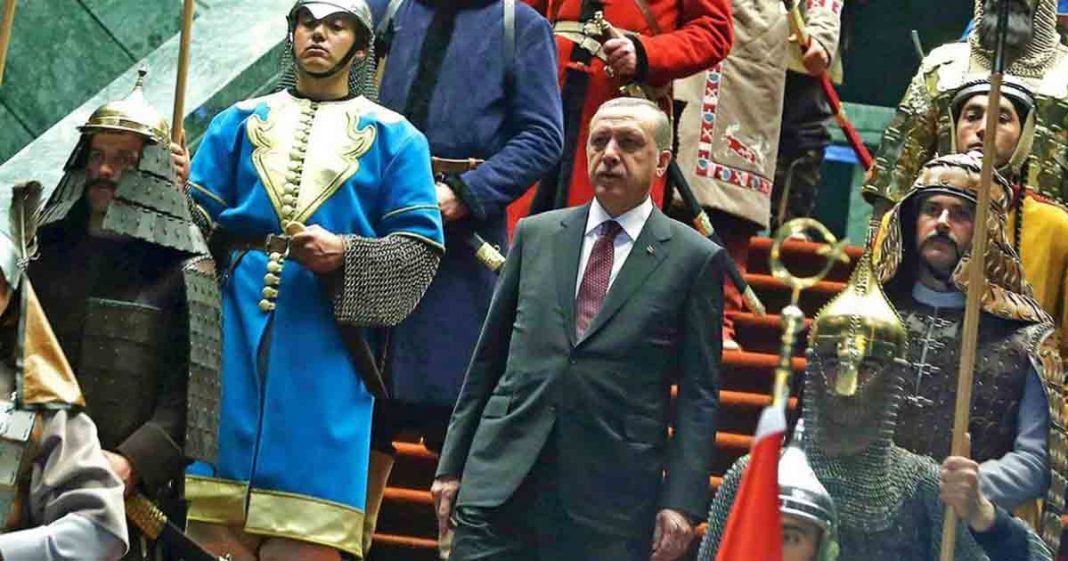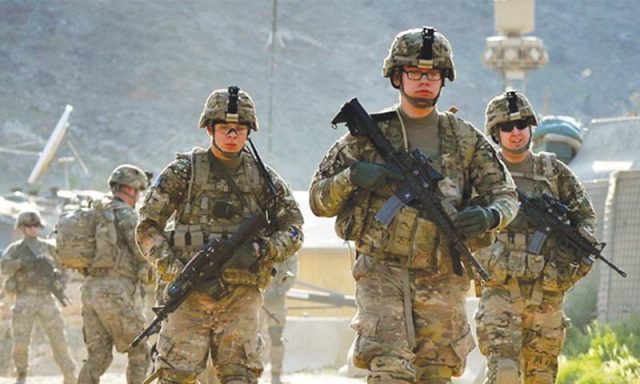For the world he may seem an autocrat in the guise of democratically elected presidency; for western media he might be a tyrant who oppresses dissent and critique; through the lens of left wingers he might be an ultraconservative Islamist leader, and from the bastions of human rights’ perspective he might be a ruthless politician; but for the majority of his citizens he is the flamboyant president who steered his country out of the tides of financial ordeal to the shores of prosperity hence regaining international respect. President Recep Tayyip Erdogan of Turkey is a versatile character. Starting his political career from a very humble background, he rose to the pinnacle of the power structure and consolidated his authority on his country. After defusing an orchestrated coup d’état, he is now revered by the politicians of third world countries who are struggling to normalize their civil-military discord.
The very recent display of this power projection is being seen in the case of Turkish military deployment in Qatar amidst the gulf diplomatic jujitsu. Ankara even offered Saudi Arabia to deploy its troops there, which the Saudis refused to.
Turkey under the leadership of shrewd Erdogan has taken up a more assertive role in the region than any of its previous presidents. Erdogan has started flexing his muscles in the region by poking nose in the affairs of the region more vociferously. The manifestation of this can be seen in Turkey’s role in the Syrian conflict, stern stance against Israel, downing of a Russian fighter jet, and huge international arms deals. The very recent display of this power projection is being seen in the case of Turkish military deployment in Qatar amidst the gulf diplomatic jujitsu. Ankara even offered Saudi Arabia to deploy its troops there, which the Saudis refused to. So what does this new assertive role of Turkey really insinuate? To answer this question, we must delve deep into the historical background of Turkey and its past role in the Muslim world.
Read more: Regional dynamics ensure that Erdogan’s ‘rigged’ referendum will be overlooked
Turkish army considers itself the custodian of preserving the secular foundations of the country and has had quashed any force that challenged the nature of those foundations. No Turkish politician or leader survived the larrup of secular army in a bid to Islamize the country. But the rise of Erdogan to the power corridors has altered the outlook of the modern day Turkey.
The Ottoman Empire under its Sultan held the title of Khalifa which was looked upon by the Muslims of the world with sanctity and sheer respect. The Sultan ruled a multinational and multilingual empire covering areas from Europe to Western Asia and the Caucasus to parts of Africa. The creation of modern day Turkey after the Turkish War of Independence against the Allied forces led by Mustafa Kemal Ata Turk abolished the seat of Khilafat. Kemal Ata Turk rapidly modernized the country by establishing ties with the West and burying the centuries old Ottomanian mindset. However, the seed still existed. The Turks felt that they were no more the leaders of the Ummah; they lost the two holy mosques to the nomadic Arabs, and their pride of steering and binding the Muslim world was dilapidated. The demise of Ata Turk marked an era of Sturm und Drang as the country was divided into two flanks: secular and religious. Turkish army considers itself the custodian of preserving the secular foundations of the country and has had quashed any force that challenged the nature of those foundations. No Turkish politician or leader survived the larrup of secular army in a bid to Islamize the country. But the rise of Erdogan to the power corridors has altered the outlook of the modern day Turkey. In his drive to Islamise the country, he has lifted rules banning head scarf; condemned feminism openly; empowered religious institutions; denounced birth control and family planning; and propagated narrative against western values. All of this seems to be of no real concern to the outside world-expect for human rights group etc. as it pertains only to the Turkish populous. What seems to be worrying the outside world are his aspirations; the aspiration to become the Sultan of Middle East. Yes, you read it right.
Read more: Erdogan’s win splits Turkey in half, opposition out on streets
Erdogan’s quest for Ottoman Empire
Erdogan is prudently harking back to the Ottoman times in subtle yet expeditious ways. In his quest to become the Sultan of the Middle East, he has embarked upon a mission to reunite the region under Turkish flag. For this, the Turkish students are given a daily dose of nationalism. Maps of Ottoman Empire relating to modern world map were being published at government level to sow the seed of irredentism in the minds of Turks. Erdogan has been open about criticizing the Treaty of Lausanne, which created the borders of modern Turkey, for leaving the country too small. The newly built lavish presidential palace worth 500 million euros resembles, according to some, the castle of a Sultan. The surge of neo-nationalism, although, is not confined to Turkey only, has been storming international politics for quite some time now. From the ascension of a demagogue like Trump to the throne of US presidency to the clinging of Hindu nationalists like Modi to Indian premiership, waves of neo-nationalism have clouded the stratospheric realm of international politics. But the brand of nationalism Mr. Erodogan is invoking in the Turks is a blend of Turkish irredentism and religious fervour.
Read more: Welcome to the new era of authoritarian leaders: Putin, Erdogan, Modi, Trump?
The recent diplomatic row in the Gulf States involving the blockade of Qatar comes as a great opportunity for Erdogan to showcase his influence in the region by leveraging the situation. The crumbling of GCC, in case Kuwait joins the Qatari bloc, would come as an extra topping for Erdogan’s Turkey. Saudis have shown no restraint in their skepticism of Turkey’s newborn military base in Qatar. In fact, the list of demands presented to Qatar from Saudi to diffuse the tension includes the closing down of Turkish military base. Elsewhere in the east, Turkish foothold in Aleppo and assertive role in Iraq against Kurds plays well with Erdogan’s ambitions to reclaim those regions and become its uncontested Sultan. In any case, Turkey won’t be annexing those areas anytime soon as for now, big powers’ interests are at stake. Whatever the future of Middle East holds, one thing is certain: Erdogan is staying in power till 2029 and his cult is only growing in the world. For now, the question is: Will he wither or will thrive?
Ahsan Hamid Durrani is a political commentator and a member of the Board of Directors in a governmental body, TEVTA KPK. The views expressed in this article are the author’s own and do not necessarily reflect Global Village Space’s editorial policy.














